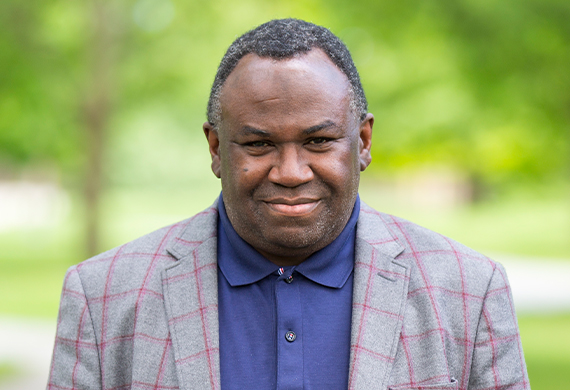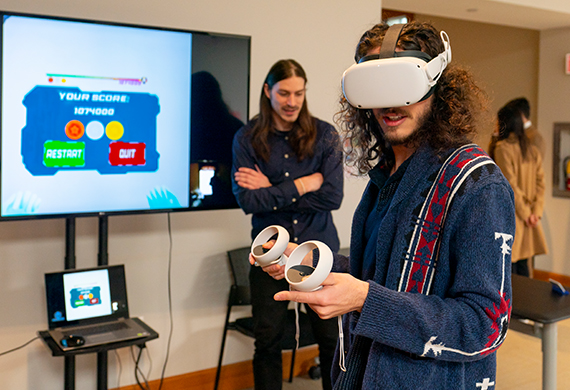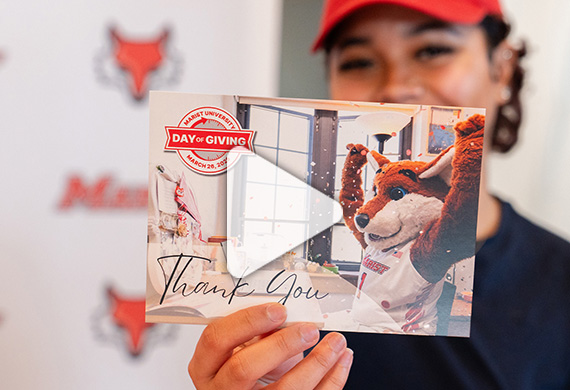Jewish Life at Marist is Alive and Well – and Growing

Hillel board (l-r): Justin Katz ’19 (President), Laura Pellegrino ’20 (member), Ilana Blumstein ’20 (Secretary), Lauren Urena-Clark ’20 (Webmaster), and Lauren Vicenzi ’20 (Vice President). Not pictured: Kenneth Vicenzi ’20 (Treasurer)
December 3, 2018—As Jews around the world celebrate Hanukkah, the Jewish community at Marist finds itself with much to celebrate. The Festival of Lights commemorates the re-dedication of the Second Temple in Jerusalem, when the sacred oil is said to have miraculously burned for eight nights. While technically not a miracle, the fact that Marist’s Jewish community is strong, growing, and more vibrant than ever is nonetheless remarkable and cause for celebration.
A historical perspective
Marist College was founded by the Marist Brothers in 1929 as a training school for future members of the religious order. Lay students began to be admitted in the 1960s, and by 1969, Marist was an independent, nonsectarian institution. For years afterward, however, the Jewish presence on campus remained small, as longtime employees can attest. As Assistant Dean of Student Engagement and Leadership Robin Diller Torres, who joined Marist in 1992, remembers it, “There were so few of us that it was like being a magical unicorn! But people were always very welcoming, and even when they were curious about aspects of Jewish life, they were very respectful in their curiosity.” Which is not to say there weren’t some occasional “oops” moments, like the time Jewish students were invited to a decidedly non-kosher lunch of pepperoni pizza or when people would pronounce shiva, the traditional Jewish period of mourning, as “sheeva.” Torres remembers these faux pas with a hearty dose of laughter and notes that they are much rarer nowadays.
Torres grew up in New York City’s Lower East Side, is yeshiva-educated, and speaks Hebrew, yet she found a comfortable home at Marist, as well as a sense of familiarity. “The Marist Brothers’ values, love of education, and global presence all resonated with me. Their strong commitment to community service was always reminiscent of the Jewish concept of tikkun olam, or repairing the world.” It was a full-circle moment for Torres to hear President David Yellen express that same sentiment when he first began at Marist. She recalls with gratitude how a former boss insisted that she not come into work during the High Holidays, even though it was an extremely busy time of year for the department. Another supervisor made sure she was able to chaperone a Marist-sponsored trip to Israel, which was her first visit to the country.
Brother Frank Kelly, Director of Campus Ministry, echoes this sense of commonality between Judaism and Catholicism. “I think both traditions share the idea that people should be of service to others and that we are called to make a worthy contribution to the construction of a better world. Service is the binding force among all religions. It’s the concept of doing a mitzvah, or as the Marist Brothers say, doing good quietly.” For Kelly, the annual Jewish events on campus – the Effron Lecture in Jewish Studies, the Holocaust Remembrance, the Passover seder, the lighting of the menorah – are all visible reminders of Marist’s core mission to educate and develop the whole person. He adds, “Marist is a private, independent college, and we welcome everyone. So when it comes to spirituality, we find ways to emphasize it in ways that are inclusive.”

Marion Blumenthal Lazan, guest speaker at the 2018 Holocaust Remembrance event
Associate Dean for Student Affairs Steve Sansola has been at Marist since 1985 and has been instrumental in planning the College’s annual Holocaust Remembrance event. Sansola also recalls that there were very few Jews on campus in the old days, although he notes that there was a Jewish Studies minor and the Effron Lecture was a yearly staple. He, too, describes a welcoming campus atmosphere and has witnessed the steady growth of campus Jewish life over time. “There has always been a feeling of support. [President Emeritus] Dennis Murray would pick my brain about how Marist could attract more Jewish students, and Brother Frank Kelly would invite me to lead the Passover seder.” Sansola notes that Marist’s founding president Brother Paul Ambrose was a frequent presence at campus seders and that Campus Ministry has long provided students with rides to local synagogues on the High Holidays.
Slowly but steadily, a critical mass of Jewish students began to form. About 10 years ago, Sansola, Torres, and a group of students spearheaded the construction of a sukkah, a temporary structure that is a traditional part of the fall holiday of Sukkot, in the courtyard of Marist’s old dining hall. (As an aside, Sansola is pleased to mention that the College’s dining services provide both kosher and halal meals for students who request them.) Additionally, Marist students are represented on the Holocaust Remembrance Committee and play a role in planning the event each year.
An inflection point
Recent years have seen both the establishment of a Hillel chapter on campus and the hiring of a part-time rabbi, and these developments have sent a clear message about the strength of Jewish life on campus. Jewish students can participate in either Hillel, a student club, or Ruach (“spirit” in Hebrew), which falls under Campus Ministry. As Kelly puts it, “Campus Ministry is interested in doing anything we can to promote both Jewish religious life and Jewish life in general on campus. Rabbi Rena Blumenthal’s mission is to reach out to all of Marist’s Jewish students.”
It was through a connection with Torres that Blumenthal joined the Marist community in spring 2018. After working as a psychologist in New York City and Jerusalem for 15 years, Blumenthal started rabbinical school in her 40s and went on to serve as the Assistant Director of the Office of Religious Life and Rachlin Advisor to Jewish Students at Vassar College. Now semi-retired, she is part of Marist’s Campus Ministry, devoting several hours a week to working with the Jewish community on campus. Blumenthal hosts Shabbat dinners and lunchtime conversations and was a key organizer of the campus gathering that took place in response to the October 27 mass shooting at Pittsburgh’s Tree of Life Synagogue. The gathering attracted a large interfaith crowd of more than 150 people who came together to denounce hate. Lauren Vicenzi ’20, a digital media major from Red Bank, New Jersey who serves as Hillel’s vice president, was one of two students reading the names of the shooting victims during the ceremony. She notes, “I was honored to be part of such an event.”
Justin Katz ’19, a business administration major from Cranston, Rhode Island, is the president of Hillel and has been with the group since the beginning. As a freshman, he sought out Hillel as a way to make friends and meet people from similar backgrounds. Although Katz is not particularly observant (he attends synagogue on Rosh Hashanah and Yom Kippur), he welcomed the opportunity to maintain his Jewish identity, attend social activities, and enjoy the feeling of community.
After his first semester, Katz joined Hillel’s board, and the group began the process of seeking recognition as an official student club. He notes, “As a club, we can do more and it’s easier for us to grow our membership.” Indeed, when Katz first got involved in Hillel, there were only five or six people, but now there are between 15 and 20 active members who attend the group’s biweekly meetings. Events such as the annual Hanukkah party, Purim party, Israel birthday party, and trips to New York City can attract double that number, and there is a mailing list of 100 people. There are also non-Jewish board members and collaboration with other cultural groups on campus. This year, Hillel will represent Jewish culture at Marist’s annual cultural dinner dance, and the students are exploring a joint event at the end of Passover with the Italian cultural club.

Members of the Marist community celebrate the first night of Hanukkah at an event co-sponsored by Hillel and Campus Ministry.
Both Katz and Vicenzi agree with others’ assessment of Marist as a safe and welcoming place for Jews. In fact, Vicenzi was looking for a school that had a Hillel and was pleased to find one at Marist. “For me, being Jewish is about spreading kindness and doing good in the world, and that’s what we’ve tried to emphasize with Hillel. For example, we just did a bake sale to benefit St. Jude Children’s Research Hospital.” She goes on to say, “We get emails all the time from prospective students asking about the atmosphere for Jewish students on campus. I always tell them about how there’s a rabbi on campus and that we’re a growing community with a busy calendar of activities.” Both students also appreciate the fact that Marist sponsors many Jewish events throughout the year. Vicenzi thinks it’s “incredibly important that these events exist,” while Katz finds it “very meaningful that the College cares enough to support Jewish life.”
Katz is proud of Hillel’s growth over the last several years, and he believes that its continued expansion depends on getting first-year students engaged in the club. He says, “It’s exciting because we’re a growing community that is coming closer together. The Jewish community has always been here at Marist, but now with an active Hillel club, it feels like we’re going from passive to active, and that’s great to see.” So what does Katz say to Jewish high school students considering attending the College? “By coming to Marist and bringing your Jewish culture here, you’re helping to build our community and attract even more people.” He hopes the virtuous cycle continues well into the future.



